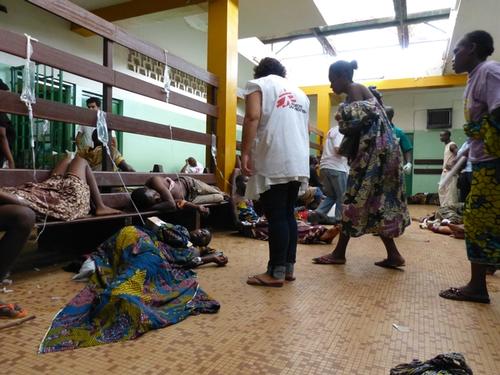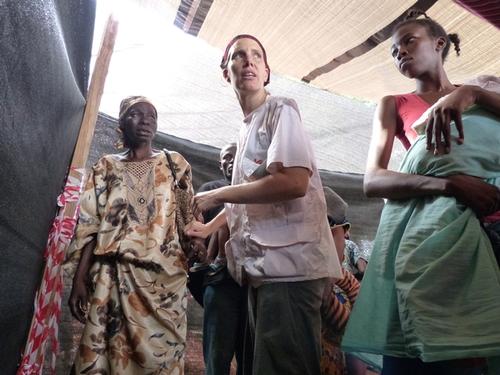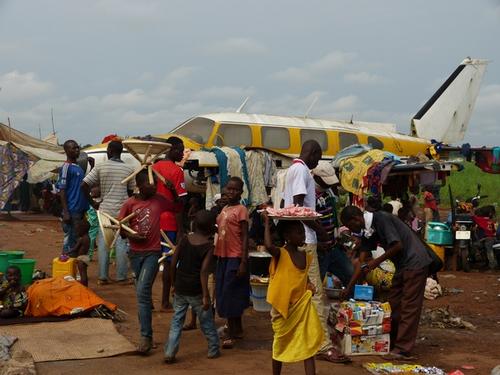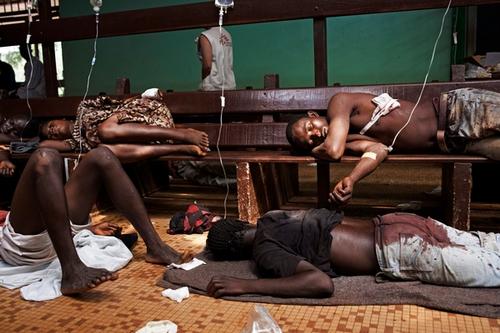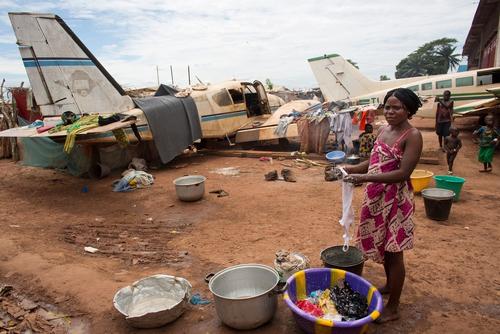On December 5, 2013, several hundred people were killed during armed clashes that shook the city of Bangui, the capital of Central African Republic (CAR). Médecins Sans Frontières (MSF) immediately began treating patients wounded in the fighting and has since been working to provide care to the large numbers of people who were forced from their homes by violence.
Ten days after the unrest began, the Office for the Coordination of Humanitarian Affairs (OCHA) estimates that 189,000 residents of Bangui—or one of every four residents—have been displaced.
Treating the wounded
On the morning of December 5, MSF teams were working at the main city hospital, the Bangui Community Hospital, providing support to Ministry of Health personnel. The organisation had rebuilt a surgical unit there the week before and a team is already present.
The early hours of the fighting were horrific, as an uninterrupted stream of patients arrived at the hospital. The corridors overflowed with patients; some had to be stabilized on the ground or on benches in the triage area. MSF teams in the hospital treated more than 100 patients, while other MSF staff members evaluated and referred wounded patients conducted in several nearby neighborhoods.
In the ten days that followed, MSF treated 390 wounded patients at the Community Hospital and performed more than 200 surgeries. Tensions eased slightly, as armed men who’d stationed themselves in front of the hospital left the scene and the flow of wounded persons slowed. Seven tents were set up to add 100 beds to the initial hospital capacity.
In the midst of the violence, on December 7, MSF began working at the Castor Health Center, which had been a labor and maternity unit before the crisis. The teams provided support for prenatal activities, including prenatal visits and labor and delivery.
Mainly, though, they focused on developing surgical capacity, so they could treat larger numbers of wounded patients. To date, MSF staff working at Castor have treated 124 patients and performed approximately 20 operations.
Responding to the medical needs of the displaced
In addition to treating the wounded, MSF’s teams responded to the massive displacement of populations terrorized by violence and looting. Working at three of the roughly 40 gathering sites in Bangui, staff has focused primarily on providing medical aid to children under 5 years of age, pregnant women, and the wounded.
Twenty thousand people are living in the Don Bosco camp. MSF has dug defecation areas, improved water supplies and held 548 medical consultations there. At the Boye Rabe monastery, where 12,000 displaced persons have gathered, the teams have helped to reorganize the health center. More than 1,300 consultations have been held since December 8 (half of those for children under 5 years of age).
However, the situation at the Mpoko camp, on the outskirts of the Bangui airport, is the most dramatic today. More than 45,000 displaced persons have gathered there in the mud, living under makeshift tarps and have not received any significant assistance.
MSF has been working there since December 7, setting up a clinic where nearly 400 consultations are now held each day.
Staff are working in a makeshift operating room to carry out minor operations, treat less serious wounds, and stabilize the most serious cases. Hundreds of wounded persons have been treated. The most critical are referred to the two hospitals where MSF is working.
In a second room, three doctors see an endless stream of patients, primarily children under 5 years. A third room is used for labor and delivery; to date, 32 children have been born there. Outside, patients are hospitalized in three tents, one of which serves as a maternity unit.
The many cases of malaria, respiratory infections and diarrheic illnesses speak to the worsening living conditions inside the camp. The displaced persons at the airport are trying to survive without adequate assistance. They have been without latrines, food aid, shelter or mosquito nets for an extended period. Children under 5 years, single mothers and pregnant women are paying the price of this neglect.
MSF has been working in the CAR since 1997 and is currently managing seven regular projects (in Batangafo, Boguila, Carnot, Kabo, Ndéle, Paoua and Zémio) and four emergency projects (in Bangui, Bossangoa, Bouca and Bria). A mobile emergency team covers the displaced persons’ camps in Bangui.
By the end of the year, MSF hopes to be able to launch activities in the hospitals in Bangassou and Ouango. We currently offer free medical care to approximately 400,000 people and provide approximately 800 hospital beds. We are working in seven hospitals, two health centers and 40 health posts. Our teams are composed of more than 100 expatriate health care workers and around 1,100 Central African Republic staff.



